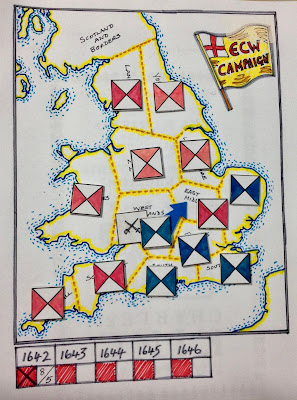The 1643 campaign year opened in May with the Battle of Pershore. When a Royalist army marched on the West Midlands region, only to be defeated over two days of fighting. The initiative was now with Parliamentary forces to launch an attack from their West Midland location. The natural option open was to move on the East Midland region, which if successful would create a buffer of regions around London and the Thames Valley.
A roll of 3 on a D3 dice decided the next battle would occur in August (May plus 3 months). Next terrain cards were draws to provide a guide to the layout of the tabletop.
 |
| Terrain cards - each one represents a 2x2 foot area and the positioning of the terrain feature on the card is reflected on the tabletop. |
The next step was to draw the campaign cards and determine army sizes. The Royalist campaign chance card showed they were able to recruit an elite pike unit to add to their recruited forces. Parliament drew a Royalist card so discard that, but they do have a carry over card for the remainder of this campaign year which allows them to use some or all of their cavalry as gallopers (rather than trotters). They drew this card on day two of the last battle and I was debating at the time whether it was a one off. I have since decided Parliament can retain the card for this year, 1643.
 |
| Chance card drawn. |
So how did the armies recruit and retain their forces between May and August 1643? The figures in brackets are a D3 dice score and * indicates the one re-roll option each side had.
Parliament Forces
- Infantry = 2 + (2) = 4
- Cavalry = 2 + (3) = 5
- Dragoons/Commanded Shot = (3)*
- Artillery/Special unit = (1) - 1 = 0
Royalist Forces
- Infantry = 2 + (3)* = 5
- Cavalry = 2 + (2) = 4
- Dragoons/Commanded Shot = (3)
- Artillery/Special unit = (3) - 1 = 2 so they will field 2 artillery units
- Plus chance card unit = 1 elite pike
On paper the Royalists enter the game with a larger force.
The tabletop will soon fill up with ECW units after I have finished messing around with a Napoleonic game I am in the middle of. Trying out a new command and control rule.
 |
| Napoleonic Spencer Smith figures do battle |




Oh, this will be an interesting deployment. Does the smaller army take to the hills with its command hampered by the marshy ground laying between or choose to defend the enclosures knowing attacking from the hills will be compromised by that same intervening marsh? Not such good cavalry country.
ReplyDeleteThe card is a bit misleading as green lines on the building card were meant to show open ground. The building looked a bit stark on the card so I drew some lines, but did not apply this approach to all cards. However, as a solo wargamer surprises should be embraced, and I will treat them as some soft ground between the hills and limit cavalry movement to that of infantry.
DeleteWe will see what the King can manage with a seeming advantage... now if his cavalry can manage to at least hold their own for once!
ReplyDeleteThey are a tad under done on the cavalry front, but with a strong infantry force holding their own should, as you say, be sufficient.
Delete